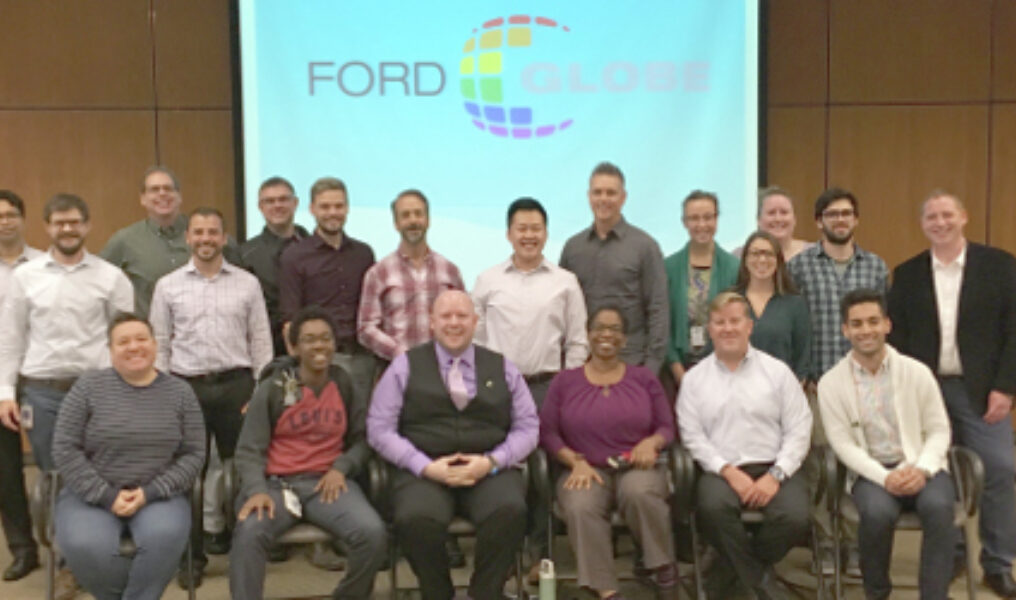During Ford GLOBE's National Coming Out Day event on Oct. 11 at the Ford World Headquarters in Dearborn, the LGBTQ employee resource group announced the GLOBE ally engagement project.
The goal is to elevate Ford Motor Company's LGBTQ ERG to the next level so they have greater influence and effectiveness beyond inclusive policies, training and diversity initiatives.
"In the last few months we've been talking about how we can turn the uninformed into allies then turn the allies into active allies," said Andrew Massaro, a representative of the ally engagement team, who addressed 40 or so employees at this first formal meeting of the group.
He pointed to some of the reasons why being an LGBTQ ally at work matters, which are listed on the Ford GLOBE website under the new "Ally" tab.
- When 62 percent of LGBTQ people hear LGBTQ jokes in the workplace, this kind of message of marginalization leads people to feel unwelcome, and that is not a One Ford behavior.
- Other minority or marginalized groups can see how well represented they are in an office setting. But LGBTQ people or allies cannot be identified from appearance alone, so the feeling of isolation is usually greater.
- Nearly one in 10 LGBTQ people have left a job because they found the workplace to unwelcoming and in 2015, roughly 50 percent of LGBTQ people were not out in the workplace.
- LGBTQ people can still be fired in 28 states. Michigan offers limited protection to municipal employees. So a private company could legally fire an LGBTQ colleague without legal ramifications.
"It takes a lot of time and effort to be in the closet in the workforce. What can we do? Primarily the idea is one of awareness. We are trying to educate people," he said. "This is a good opportunity to engage people who want to have conversations, but might not be sure about how to start them."
Massaro said so far, the team has created a visual identifier like the GLOBE ally sticker that can be placed on a desk or door, for example, and a digital identifier to add to the bottom of email signatures.
"This is wonderful to see. I'm excited to see this happening," said Bill Peters, GLOBE board chairman, who began this brainstorm with GLOBE members when he heard about ally engagement initiatives happening at other companies.
"A lot of ERGs that have been established for years in LGBTQ spaces are asking the questions 'What is our next step?' 'What is another piece we can add?' 'How can we engage more allies?'" he said, noting that without allies, GLOBE would not exist.
Alice McKeage, co-founded Ford GLOBE back in 1994 with Rob Matras. They wrote a letter to the vice president of employee relations with a copy sent to the Ford Motor Company CEO Alex Trotman to start a dialog on gay, lesbian and bisexual workplace issues.
GLOBE became an official ERG in 1995 for salaried, hourly and retired employees of Ford Motor Company, its subsidiaries and agency personnel who are LGBTQ and their allies who support an inclusive and safe workplace for all employees. GLOBE has expanded to more than 480 members with chapters as far reaching as Mexico, Germany and the United Kingdom.
Ford Motor Company has scored a 100 on the Human Rights Campaign's Corporate Equality Index every year since 2004 which is attractive to employees like Lynn Keiser. She started working with the company in September 2015 and transitioned while at work in February 2016. Her story, "Transitioning at Work Doesn't Have to Be a Nightmare," was printed in The Advocate.
She wrote that GLOBE helped connect her with LGBTQ employees and allies across the world for mentoring and support, and she was able to have conversations with other trans women working for the company.
Keiser said in the article that, "Everyone has accepted me and made me feel very comfortable as I made my transition. Not only do my coworkers accept me, but even a couple of Ford's top executives have asked me how I'm doing and expressed interest in learning about my experience as a trans woman at work."
GLOBE has been a part of the remarkable history in the development and the evolution of the Ruth Ellis Center since 2006. Employees volunteered their time to help prepare the Second Stories Drop-In Center at the youth social services agency which provides short- and long-term residential safe space and support services for runaway, homeless, and at-risk LGBTQ youth in Highland Park and Detroit. GLOBE has also held numerous fundraising events to raise funds for the Center.
Mark Erwin-McCormick, director of development and advancement at the Center, was invited to speak at the event. He talked about allies who often times pave the way for LGBTQ young people.
"Allies are incredibly important because we can only preach to the choir for so long, right? I need allies to be able to tell the story. I need allies to get rid of that stigma. I need allies to create a space so that I can be my authentic self when I come to work…If I have allies around me, creating that safe space for me, then I get to be me and the next person who comes in behind me gets to be themselves too," he said, noting that the LGBTQ community should operate from a strength-based approach.
"We have to meet individuals where they are," he said. "The fact that they are willing to learn and to engage and to be supportive means that we except their limitations of current knowledge on LGBTQ cultural competency and give them a pass to make mistakes as we are offering them opportunities to learn more."
For example, he said, "If someone misgenders somebody else, but automatically corrects themself and apologizes and tries to work at it and get better then we should not fault that individual. We should praise that individual for making that effort."
During the panel discussion moderated by Holly Lashbrook, LGBTQ and ally employees spoke about their experiences being out and why it is important to be their authentic selves at work.
"Since I've been here at Ford, I've had nothing but positive experiences with coworkers, with managers," said Matthew Gray, Ford GLOBE board member. "I got married about a year and a half ago and my whole department came together, bought us a big bottle of champagne, threw a little party for the two of us. It's really nice being able to just be yourself in this environment and be respected for the contributions you can make to the company regardless of whether or not you happen to like the person I go home to in the evenings."
For Tracy Mitchell, she was intentional about her choice to work in a place like Ford Motor Company where she can be out.
"I want people to know who I am. It makes me a better worker and people can't know who I am if they don't know I have a wife," she said. "Being an authentic person also makes me a better worker and a better person."
Ford GLOBE Suggests Five Ways to be an LGBTQ Ally in the Workplace
- Let LGBTQ voices be heard: As allies, we can empathize and advocate for the LGBTQ community, but we cannot speak directly for them. Accordingly, it is important that we center our efforts on how we can be most helpful.
- Send gentle signals: Showing and sharing your acceptance and support can be very easy. Many people often don't realize that LGBT people keep watch for signs from their friends, family and acquaintances about whether it is safe to be open with them. It can be as subtle as having an LGBT-themed book on your coffee table.
- Speak up: Anti-LGBT comments and jokes are harmful and it's important to let your friends, family and co-workers know that you find them offensive. A simple and non-confrontational statement can go a long way to taking a stand against LGBTQ discrimination.
- Question heteronormity and challenge stereotypes: In today's society, we generally assume that everyone is straight and gender-normative. We assume that everyone is cisgender (identifying as the gender that matches the sex one was assigned at birth). As result, people often hide who they are. This creates a lot of stress and thereby health disparities.
- Remember that you're human: Nobody knows everything. Don't be afraid to admit what you don't know! Allow yourself to make mistakes and learn from them. Give yourself time to learn, ask questions, and explore your own personal feelings. Curiosity is healthy and can lead you to understanding others better through respectful dialogue.










